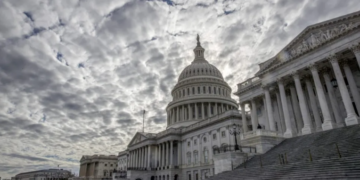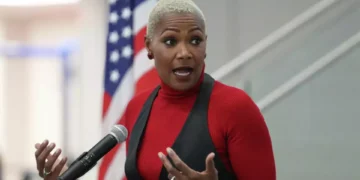mg source: msnbc.com
April 1, 2024 Story by: Publisher
Allies of former President Trump are strategizing a significant shift in the government’s approach to Civil Rights-era legislation if he were to reclaim the presidency, with a focus on combating what they term “anti-white racism” over discrimination against people of color.
The proposed changes aim to dismantle or overhaul programs within government and corporate sectors aimed at addressing racial disparities that have historically favored whites.
These initiatives range from longstanding policies promoting economic opportunities for minorities to more recent programs arising from the pandemic and protests following George Floyd’s killing.
Steven Cheung, a spokesperson for the Trump campaign, affirmed to Axios: “As President Trump has said, all staff, offices, and initiatives connected to Biden’s un-American policy will be immediately terminated.”
Efforts to lay legal groundwork for such changes have been underway among Trump’s long-standing aides and allies, evident in a series of lawsuits and legal challenges, some of which have seen success.
One pivotal entity driving this agenda is America First Legal, spearheaded by former Trump aide Stephen Miller, who characterizes the group as conservatives’ response to the ACLU.
Citing the Civil Rights Act of 1964, America First Legal filed a lawsuit in February against CBS and Paramount Global alleging discrimination against a white, heterosexual male writer on the show “Seal Team” in 2017.
In another instance, the group filed a civil rights complaint against the NFL regarding its “Rooney Rule,” contending that the rule limits opportunities for well-qualified non-minority candidates due to time constraints in hiring processes. Source: Axios.com
Further, the organization successfully challenged a pandemic-era relief program for women- and minority-owned restaurants, arguing it discriminated against white-owned businesses.
Parallel to these efforts, other Trump-aligned groups are gearing up for potential Justice Department interventions or challenges on a broader scale, notably the Heritage Foundation’s “Project 2025,” which aims to end what it labels as “affirmative discrimination.”
With the Supreme Court’s conservative shift, recent rulings rejecting affirmative action in college admissions have emboldened such groups, arguing that programs designed to address historical injustices favoring people of color discriminate against white and Asian Americans.
Critics of these initiatives view them as a backlash against policies promoting equity, which Trump has vehemently opposed, promising to eradicate what he terms “Marxist” concepts from government institutions.
Trump’s assertions of being a victim of racism echo through his political career, from his championing of the birther movement targeting President Obama to his derogatory remarks about Mexicans at the outset of his presidential campaign.
While these endeavors reflect a polarized view on race and equity in America, polling suggests a growing divide among voters regarding perceptions of racial advantage and support for Trump’s stance on race-related issues.

















